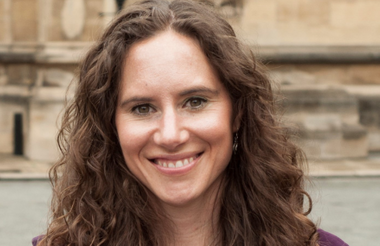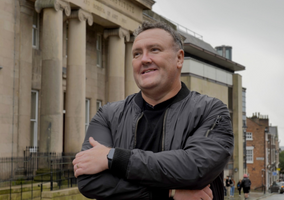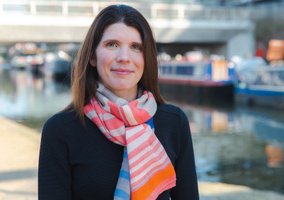Formed in 2013 from the merger of Impetus Trust and The Private Equity Foundation, Impetus aims to transform the lives of young people from disadvantaged backgrounds.
Eleanor Harrison joined as chief executive in September 2020, having led Safe Passage International and been CEO of GlobalGiving UK. Prior to that, Harrison ran a children’s charity in Kenya for five years and led programmes for refugees and young people in the UK.
“I've always been in the charity sector, even before I was old enough to have a job because my parents were in youth work,” she explains. “So, I was brought up to believe you always need to be engaged with the community in which you’re living”, and so “I came to the sector through volunteering”.
“I am a person of Christian faith [...] which does impact on my day job. Probably, one of the reasons that I work in the charity sector is because I believe you should help other people and through helping others you help yourself.”
‘Disjunct between the evidence and what is funded’
Harrison would like to see more passion for outcomes and rigour for data to be in all funders and charities in the near future.
She says there is somewhat of a “false positive in the sector” where impact reporting often means talking about “the great stuff” but “if you’re genuinely committed to more and better outcomes, the numbers will look a lot smaller”.
“The reality is if you actually measure organisations against meaningful benchmarks, the results are a lot smaller because some young people would have made it irrespective of your intervention.
“We’re not criticising anybody, but just saying we’ve got so used to very positive data and there’s such a focus on reach instead of outcomes that it’s then really hard for organisations to be honest when the numbers can look quite small.”
The CEO says “there’s nothing wrong with good stories, good stories are powerful and they motivate us”, but Impetus believes that it is “important to have very open, honest and challenging conversations, both with our charity partners and with our funders and supporters because we’re all in it for the long game”.
Harrison says Impetus as an organisation is fortunate that a very high percentage of its funding is unrestricted and that its donors are very interested in data.
“We have taken them on that journey not to expect incredible numbers of outcomes because we want the data to be honest. And we also wouldn’t expect a charity we’re investing in, in maybe year two or three, to be delivering benchmark-beating outcomes. That would be highly unlikely because you’ve got to really build the integrity of your data.”
Impetus is focused on outcomes and measurement, but Harrison notes: “You need to keep an eye out for the long term because often some of those outcomes take a long time to do and unfortunately, there is underinvestment in this space.”
‘We’ve been funding some things for over a decade’
Harrison joined Impetus specifically because of the deep investment model as “there’s very little long-term unrestricted funding available for great organisations”.
“The fact that I would be involved in making sure there is more unrestricted funding available in the sector with that expertise is what pushed me to where I am today.”
She adds that Impetus takes a long-term approach and that “we’ve been funding some things for over a decade, with unrestricted funding”.
Harrison thinks the funding market is “evolving” but “you’re in a complex environment because you have philanthropic funders who are still being very generous, but you’re also in a very restrained statutory funding environment”.
‘Can we increase our grants in line with inflation?’
During the coronavirus pandemic, Impetus was “affected from all angles” but gave out significantly more funding to those who were in the most crisis and did a lot of financial scenario modelling.
The pandemic then fed into the inflation crisis, “which has an impact both on our charities, so their ability to deliver their programmes to their young people, people presenting in greater needs, but also the recruitment crisis that many people have seen in the charity sector”.
“We gave out emergency funding during Covid-19. But can we now, post-Covid-19, increase our grants in line with inflation? Have donors given in inflation-busting ways?”
Harrison notes: “We have managed to grow our funding base but that has been growing by building new funders and bringing them into our family.”
The charity has also needed to strike a balance between “making sure that we pay our staff well, retain them well, while making sure that more money is getting to young people”.
‘It’s really hard being a leader today’
Harrison says “it’s really hard being a leader today” and it “can sometimes feel like you’re a firefighter”.
“But you don’t do your best work when you’re in firefighting mode. You might in the moment do some high-quality work, but you need to be able to sit back and think and have that important sounding board,” Harrison reflects.
She also points to the lack of diversity, particularly in senior leadership at bigger organisations.
“I know that diversity makes you a smarter and better organisation, and we say diversity of thought, background and experience. So, how can we turbocharge that because we need to change the people in the room when decisions are being made?”
Harrison says that the challenges around equity and diversity inclusion have “always actually been more nuanced than has been presented”.
“I would say that there was always really good diversity in the grassroots sector. But that hadn’t fed through to your national scale players.
“And so when Black Lives Matter came to the fore, I don’t think the whole sector was in crisis, but the most public-facing part of the sector felt like it was in crisis or needed to do something.”
Impetus formed a race equity taskforce in the summer of 2020, just as Harrison was arriving. “We thought: ‘We won’t try to change anybody else; we will change ourselves.’”
The charity set a number of recommendations, for example that 40% of its team should be people of colour because it is a London-based organisation, and that is the local benchmark – “and we’re that today”.
The organisation also launched the Impetus Leadership Academy for emerging leaders from the UK youth sector from ethnic minority backgrounds, to support them into senior leadership positions.
But Harrison adds that the charity thinks of other areas of diversity too. She says as the team was “quite London-centric”, it was “perhaps overly represented in terms of middle-class thinking because we would argue that the sector has a class challenge as well”.
“We’ve just done some internal data collection on class and it’s really difficult because of how you feel about class. Even if you have disadvantages in your life, you might feel differently about where you are now.”
Harrison also points out “inevitable challenges for the wider sector” such as the fact that salaries have been held down, particularly in frontline roles – “that makes it even harder for people from more disadvantage to be able to work in the charity sector to then be able to progress to senior roles”.
She says: “I think there is much better intentionality around diversity than there was a few years ago. And I think some people are doing really good thoughtful work. I think that other people are finding their way, and I don’t think we’re considering all equity, diversity and inclusion issues.”
Related Articles












